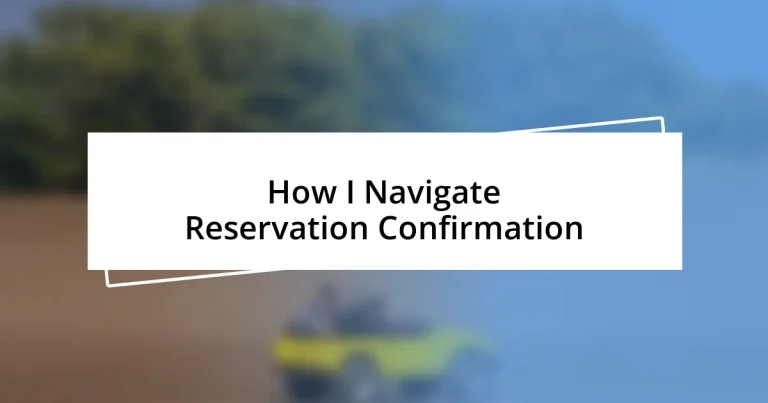Key takeaways:
- Reservation confirmations provide peace of mind and ensure a smooth travel or dining experience, highlighting the importance of accuracy in details.
- Common mistakes include overlooking fine print, failing to cross-check details, and misunderstanding cancellation policies, which can lead to significant issues.
- Utilizing technology, such as confirmation apps and cloud storage, streamlines reservation management and enhances organization, reducing the risk of errors.
- Best practices for confirming reservations include double-checking all details, setting reminders, and personalizing communication with providers to enhance the overall experience.
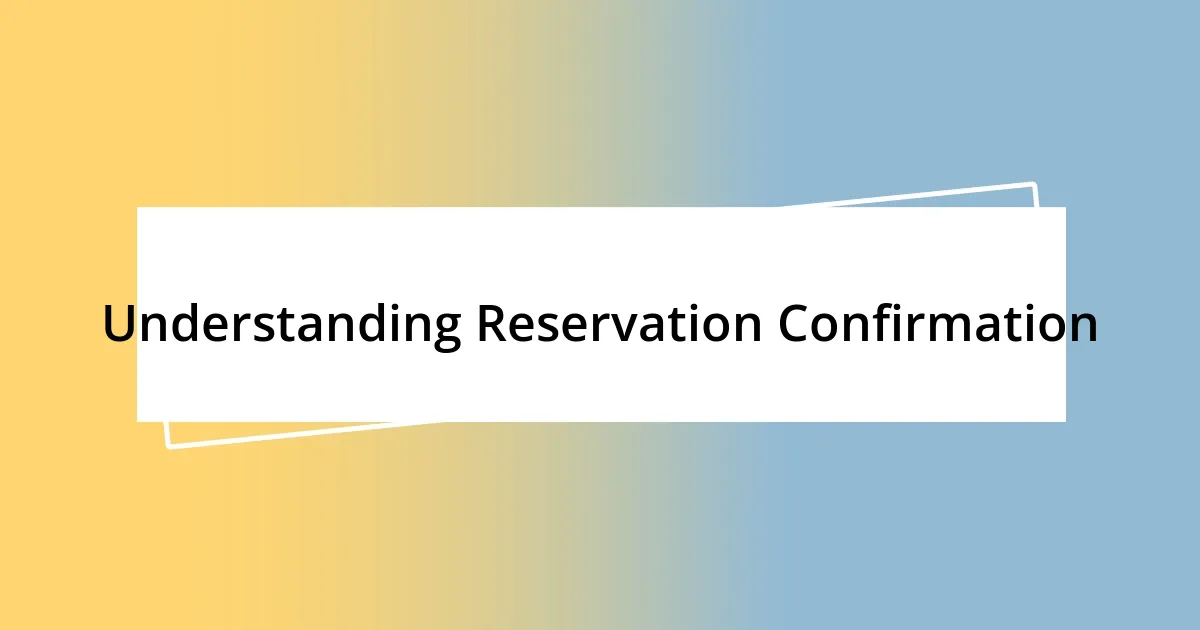
Understanding Reservation Confirmation
When I think about reservation confirmation, I am reminded of that moment of anticipation right after booking a flight or a dinner reservation. It’s that little email or text that brings a rush of relief and excitement, isn’t it? I often wonder how many people really understand what those confirmation details mean and how they can impact their travel or dining experience.
Over the years, I’ve experienced a mix of emotions tied to reservation confirmations. There was that time I double-checked my hotel booking just to find an error in my name—thankfully, the confirmation email saved me from a potential headache at check-in. Have you ever found yourself in a similar situation? Those confirmations hold more than just a reference number; they encompass peace of mind.
Understanding the nuances of reservation confirmation is crucial. It includes not just the confirmation number, but also the date, time, and any specific requirements or notes you might have shared. I always advise friends to read through it carefully; even the smallest detail can make all the difference when you arrive at your destination. How often do we breeze past the fine print, only to find ourselves unprepared later?
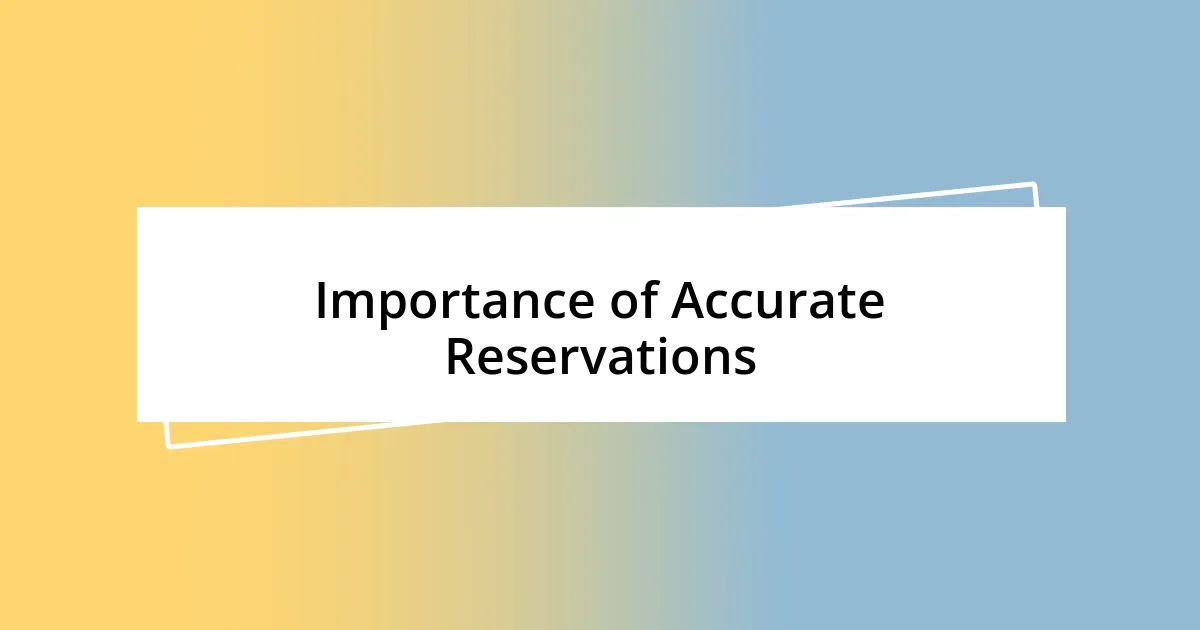
Importance of Accurate Reservations
Accurate reservations are the cornerstone of a smooth experience, whether you’re flying to a new destination or savoring a meal. I once learned this lesson the hard way during a family trip when a miscommunication about our flight departure time left us sprinting through the airport. That chaotic moment underscored just how critical it is to ensure that every detail is correct. Accurate information isn’t just a formality; it paves the way for a stress-free journey.
I find that the emotional toll of incorrect reservations can weigh heavily. For instance, on a romantic dinner date, everything seemed perfect until we arrived at the restaurant and found out our reservation had been lost. The disappointment was palpable, not just for us but also for the staff who were trying to accommodate our last-minute plea. Experiences like this reinforce the notion that accuracy in reservations isn’t simply about logistics; it’s about expectations and feelings.
Moreover, the ripple effect of an inaccurate reservation can extend beyond just inconvenience. I think back to a business trip where I relied on a hotel confirmation to secure a crucial meeting spot. When I arrived, I learned that the reservation was never logged correctly. This could’ve affected not just my schedule but also potential partnerships. Trust me when I say that having an accurate reservation is essential not only for your travel plans but for the peace of mind that accompanies them.
| Aspect | Importance of Accuracy |
|---|---|
| Peace of Mind | Helps reduce anxiety about the unknown. |
| Travel Efficiency | Ensures timely arrivals and smooth transitions. |
| Avoiding Disappointment | Minimizes the risk of unexpected surprises. |
| Trust | Builds confidence in future bookings and relationships. |
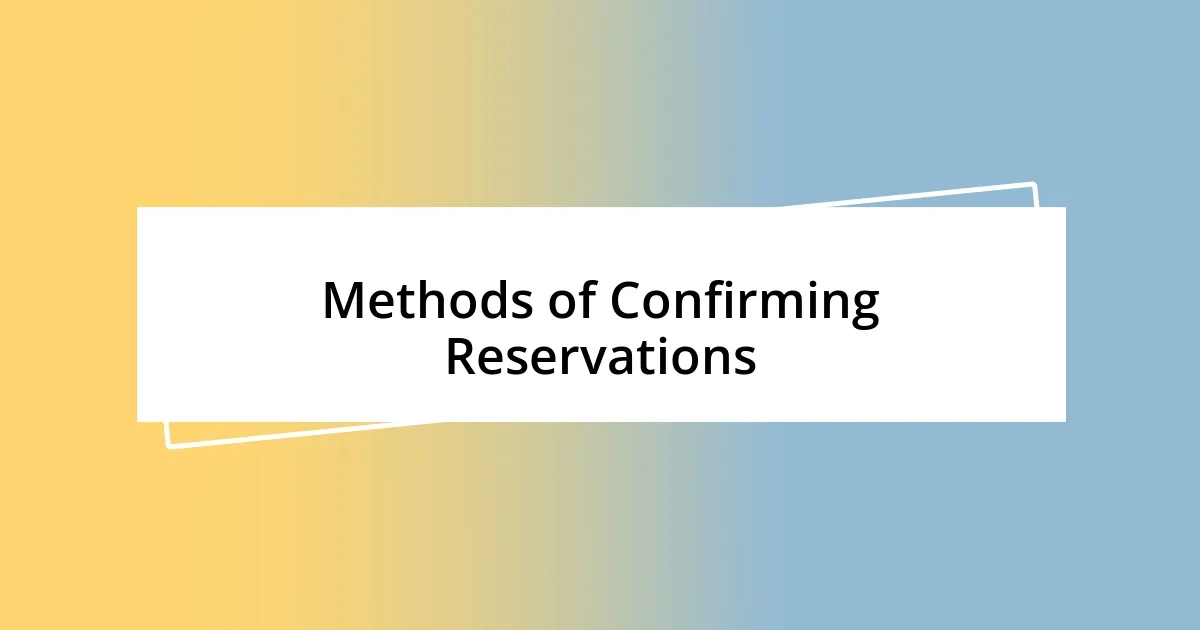
Methods of Confirming Reservations
When it comes to confirming reservations, I always find it helpful to explore various methods—each brings its own set of advantages. For me, receiving a confirmation email feels secure, like a digital handshake enriching my trust in the booking process. I remember a trip where the confirmation text message I received not only reminded me of my flight but also provided a direct link to view all details, which was super handy at the airport. Embracing these methods can enhance your travel experience.
Here are some prevalent methods of confirming reservations:
- Email Confirmation: This is the most common method and usually includes all essential details like dates, times, and any special requests.
- Text/SMS Notifications: Perfect for those who are always on the go; it delivers instant updates straight to your pocket.
- Mobile Apps: Many companies now offer apps that provide easy access to booking details, cancellations, and changes.
- Phone Call: Though it may feel old-fashioned, calling the establishment offers a personal touch and immediate confirmation from customer service.
- Website Portal: For tech-savvy travelers, signing into an account on the company’s website can confirm reservations and allow for easy modifications.
Each method has its merit, and I often switch between them depending on what feels most convenient at the time. There’s something particularly satisfying about pulling up my itineraries on an app just minutes before heading out—like having all my plans neatly stitched together in one spot.
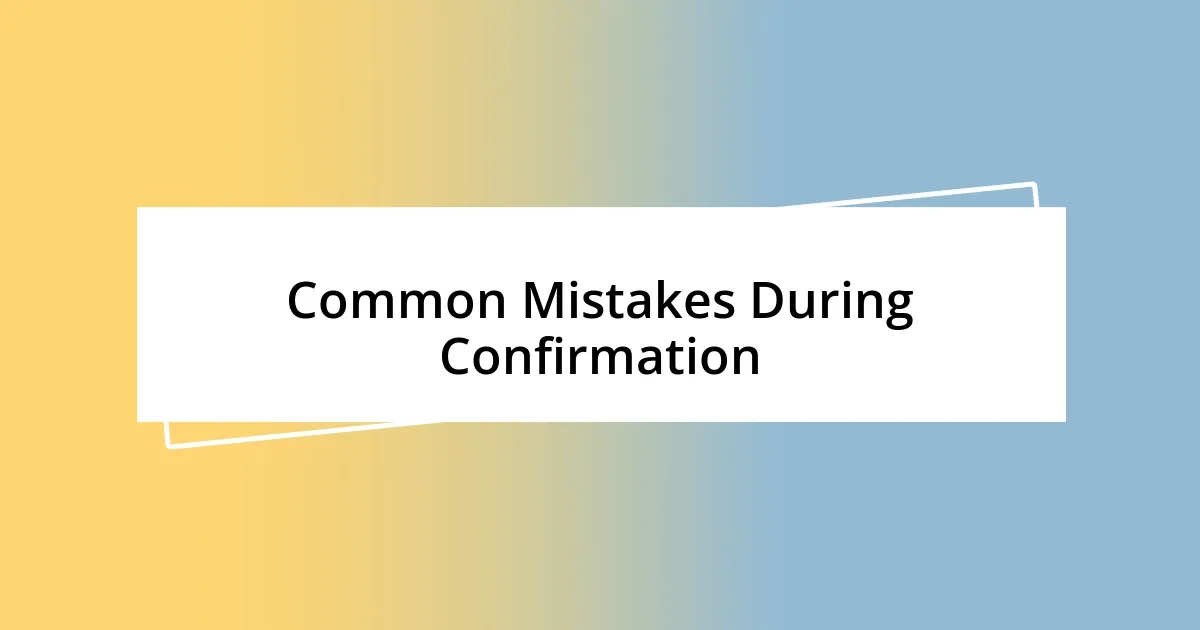
Common Mistakes During Confirmation
One common mistake I often see is overlooking the fine print during reservation confirmation. Just the other day, I made a hotel booking, and I was so eager to secure my room that I skimmed through the details. When I arrived, I discovered I’d booked a non-refundable rate, which caught me completely off guard. If I had taken a moment to read everything thoroughly, that stress could have been avoided. Isn’t it frustrating when a simple detail turns into a significant issue?
Another mistake that many people make is failing to cross-check their details with the provider. I remember confirming a rental car online, but when I picked it up, the agent had no record of my reservation! The panic set in as I realized I hadn’t double-checked with the rental service. I ended up spending an extra hour figuring things out, which could have easily been avoided. How often do we trust automated systems without validating them ourselves?
Lastly, many folks forget to clarify the cancellation policy during the confirmation process. Not long ago, I made dinner plans and assumed everything was flexible, only to find that my reservation had stringent rules attached. It taught me a valuable lesson; understanding the cancellation policy not only prepares me for the unexpected but also provides peace of mind. Have you ever had that sinking feeling when plans don’t go the way you anticipated? Knowing the rules can make all the difference.
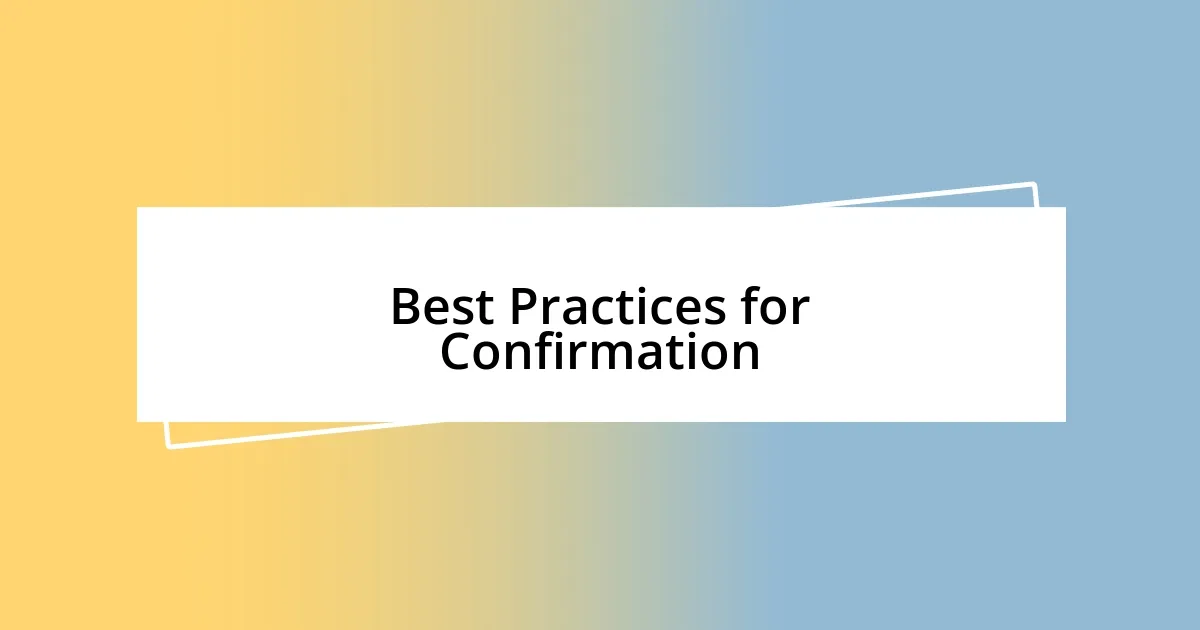
Best Practices for Confirmation
When confirming reservations, it’s crucial to double-check all details before finalizing anything. I once booked a cozy cabin for a weekend getaway with friends but didn’t notice that the check-in time I selected was late in the evening. We ended up arriving to a darkened cabin and had a moment of panic wondering if we’d be stuck outside. Now, I always take a few extra minutes to ensure I understand timings and other key details, which saves a lot of hassle later.
One practice that has transformed my confirmation process is using reminders. A while ago, I forgot to check my email for confirmation just before a trip, assuming everything was smooth sailing. Fortunately, I had a calendar alert set for the day before departure, which prompted me to review my reservations. That simple reminder brought peace of mind and allowed me to rectify a minor issue before it became a significant headache. Have you ever not checked your confirmation and ended up scrambling at the last minute?
Also, personalizing my communication with the provider can be a game-changer. During a recent hotel stay, I sent a brief message just to clarify my special requests. The hotel responded promptly, confirming my requests and adding a warm note about looking forward to my visit. It made me feel seen and valued as a guest, which is something I always appreciate. Have you considered how a small interaction can enhance your overall experience? Making these tiny connections can often turn a simple reservation into a welcomed experience.
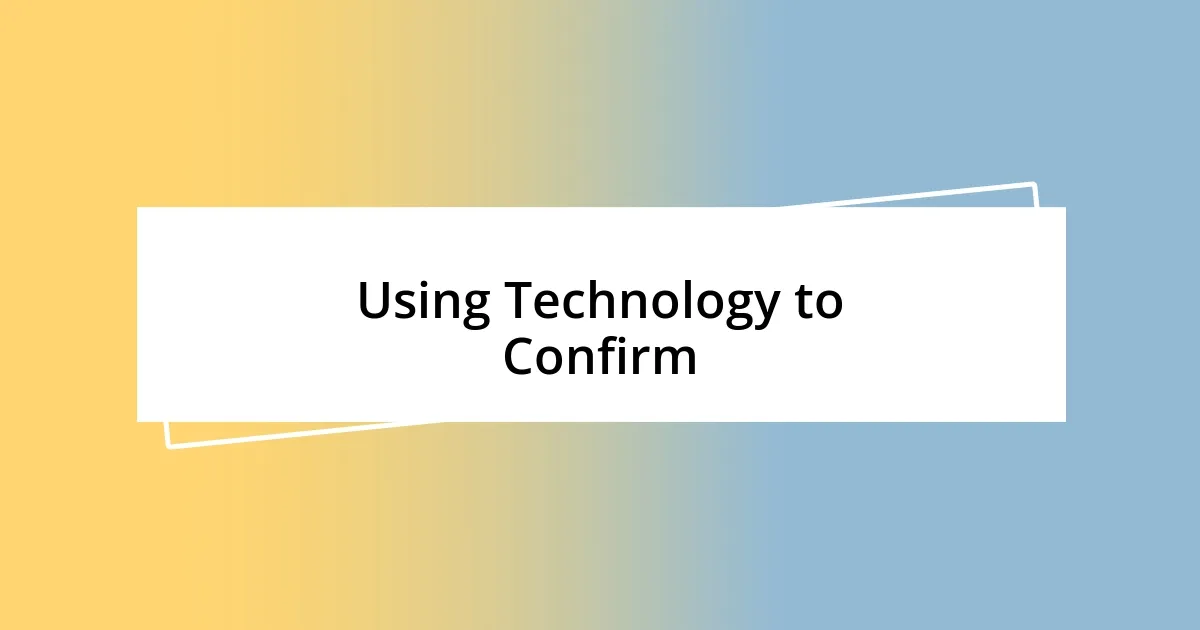
Using Technology to Confirm
In today’s fast-paced digital age, technology is my best ally for confirming reservations. I rely heavily on apps and websites that send confirmation notifications directly to my phone. Recently, while booking a flight, I was pleasantly surprised to receive a push notification with my confirmation details within minutes. It felt reassuring, knowing I had all the necessary information right at my fingertips. Isn’t it amazing how technology can streamline what used to be a cumbersome process?
I’ve also discovered that cloud storage services are invaluable for keeping all my confirmations organized. A few months ago, I traveled for work and realized I had multiple bookings scattered across different platforms. By storing all my confirmation emails in a dedicated folder in the cloud, I could access everything easily, even while on the go. Have you ever felt overwhelmed by confirmation emails piling up? This approach not only declutters my inbox but also ensures I’m never caught off guard by an overlooked detail.
Moreover, I find it helpful to utilize chatbots or customer support via apps to confirm my reservations. During a recent hotel stay, I had a quick question about my room preferences. Instead of waiting on hold, I used the hotel’s messaging feature on their app, and my inquiry was addressed within minutes. This immediate feedback made me feel valued and connected to the service. How do you prefer to handle quick queries? The convenience of technology truly enhances my assurance during the reservation process.












